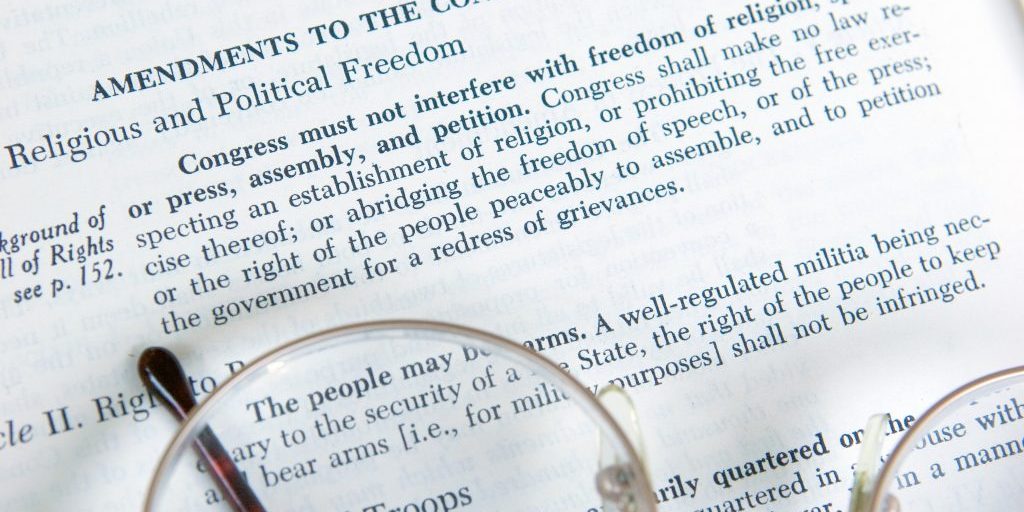Does the First Amendment Protect Your Job?
BY Kerrie Spencer

LISTEN
President Trump's recent comments on Twitter have reignited a conversation regarding freedom of speech in the workplace.
Freedom of speech in the workplace is an entirely different thing than freedom of speech in a public venue.
The reason for this differentiation arises out of the idea that at work an individual does not represent “himself or herself” they are representing the company. In public, an individual represents themselves.
Realizing the differences may avoid a messy dismissal. However, speaking out at work about a potentially controversial topic could have a potentially problematic outcome, depending on the circumstances, the content and the presentation.
The Line in the Sand – the Beginning of the Story
A few weeks ago Google took a hard stance over a memo written by one of its male software engineers, James Damore. The controversial memo included his account of internal problems at Google. However, Damore's observations that women were subject to more “neuroticism,” had a lower tolerance for stress and were thus not well suited to be software engineers, created a national controversy. The 28-year-old engineer was fired from Alphabet Inc’s Google.
Google’s CEO Sundar Pichai’s company-wide email indicated Damore violated their Code of Conduct by "advancing harmful gender stereotypes in our workplace." Damore plans on suing Google for wrongful dismissal. And also informed Breitbart that “Google’s left bias has created a politically correct mono-culture that maintains its hold by shaming dissenters into silence”.
Damore’s memo was seemingly a political tone that appealed to the political right, a point-of-view that turned him into a brave man for telling the truth that men were possibly more biologically suited to coding jobs and that some companies just shunned the liberal left and forced those who espoused that point-of-view out. In other words, firing someone for holding such a view was tantamount to censorship, a comment floated on Twitter by Julian Assange, Wikileaks publisher.
Damore, who had been onboard at Google for four years, posted his 10-page memo on an internal Google discussion board and included some tenets of evolutionary psychology arguing woman are not suited to be good engineers because they are more interested in people than ideas.
This is not the first time that diversity in the tech workplace and gender bias has reared their heads. Witness Ellen Pao’s gender discrimination lawsuit in 2015 that opened the door for women to speak up about being punted to the sideline in their jobs, particularly in the engineering niche. There was also the scandal involving Uber Technologies Inc., former CEO, Travis Kalanick, who was fired for discrimination, sexual harassment and promoting an aggressive, hostile work environment.
The latest Google debate about employment diversity comes when the company is defending itself from a lawsuit filed by the U.S. Department of Labour alleging it systemically discriminates against women. Google has declined to reveal full salary information relating to gender gap and pay, but 80 percent of technical support staff is male and 69 percent of their workforce is also male. This is an employment discrimination case and not an overtly political issue, although it has been seen as being political for various reasons.
Damore’s remarks and the law
Far from being political in nature, it seemed that Damore’s comments and point-of-view about women not being suited to be engineers caused Google to let him go for “perpetuating gender stereotypes.” Perpetuating gender stereotypes is not necessarily a political issue, nor a First Amendment issue, but certainly may be viewed as a legal issue and a component of discrimination and harassment in the workplace. Often, the First Amendment is invoked when defending cases like Damore's. However, the First Amendment does not apply.
Did Google break the law by firing Damore? The opinions on that vary depending on the reason for the remarks, and that is a very crucial point. Says San Diego employment attorney Dan Easton, “It is unlawful for an employer to discipline an employee for challenging conduct that the employee reasonably believed to be discriminatory, even when a court later determines the conduct was not actually prohibited by the discrimination laws.”
Where does politics fit into this firing? “Federal labor law bars even non-union employers like Google from punishing an employee for communicating with fellow employees about improving working conditions … California law prohibits employers from threatening to fire employees to get them to adopt or refrain from adopting a particular political course of action,” adds Easton.
Damore included political remarks and discriminatory remarks in his memo. The overall interpretation of the memo is either going to have to be deconstructed or taken as a whole, which can be problematic.
Damore indicates he is seeking to pursue a lawsuit, but attempting to use the right to free speech as the foundation of the suit might not be enough, because the First Amendment only offers protection from government censorship.
The First Amendment bans the making of any law respecting an establishment of religion, ensuring that there is no prohibition on the free exercise of religion, abridging the freedom of speech, infringing on the freedom of the press, interfering with the right to peaceably assemble, or prohibiting the petitioning for a governmental redress of grievances.
The First Amendment does not prohibit preclude a company dismissing an employee as a result of their speech. Says senior staff lawyer at the ACLU Speech, Privacy & Technology Project, Lee Rowland, “As a private company, Google has the right to discipline employees for their speech or for violations of their code of conduct. But every company should use that power judiciously to avoid creating a perceived political litmus test for employment."
According to Damore, he also filed a complaint to the National Labor Relations Board (NLRB) and that his firing, which he considers to be retaliation for his memo, is illegal. Filing a complaint does not mean a business cannot terminate a worker for being in violation of its code of conduct or in violation of company standards.
At issue is the political component of Damore’s memo. While it may be acceptable to air complaints, and different points-of-view in the spirit of open communication and thought exchange via an internal company forum, it may not be acceptable (to the employer) to bring up gender bias if it impacts co-workers and/or clients.
“The use of company resources to spread highly divisive political thought is inappropriate," commented Aine Donovan, director of the Dartmouth College Ethics Institute. "Whether the content was liberal or conservative it's not appropriate for an employee to misuse resources in this way."
Kneeling during the national anthem
Where does kneeling during the national anthem, or "taking a knee" fit into the First Amendment? The concept of freedom of speech, and its various forms, is a protected right.
The recent controversy got started when President Trump tweeted that the NFL should fire any “son of a bitch” who showed “total disrespect of our heritage.” Trump further doubled down saying those players should be suspended or fired. In fact, in 2016 Colin Kaepernick kneeled during several pre-game anthems to call attention to police brutality and racism in the United States. In response to Trump’s tweets a firestorm has erupted among various NFL teams, taking a knee during the anthem, as a show of unity for Kaepernick.
Can we equate a football player kneeling during the national anthem to office workers expressing their opinions at the office and being fired? Is the opinion being expressed personal or officially on the part of the team or company? Does the First Amendment protect the right to share a political opinion and keep a job? In short: No. An example of this occurred after the march of nationalists in the Charlottesville, Virginia. One participant in the march was identified by social media users, causing him to lose his job at a hot dog chain.
The First Amendment guarantees freedom of religion, expression, assembly and the right to petition. It also prohibits the government from interfering in the free exercise of speech and religion. In addition, the First Amendment does not “necessarily” shelter private-sector workers who make statements for causes with which their employer does not agree.
According to Mark Tushnet, a law professor at Harvard Law School, private-sector workers are usually at-will hires of the employer and they can be fired as the employer sees fit. Invoking the First Amendment in those types of situations is done because people think they have the absolute right to say whatever they want. That is not the case in a private workplace and it is incumbent on workers to be mindful of their actual workplace status and situation because an employer could take action against them. This is even more relevant in the social media milieu of today. Speaking out at work can be risky, particularly if the remarks are politically incendiary.
What many Americans do not realize is that free speech in the workplace is different from free speech in a public space and the reason is that in the workplace an employee is not just representing themselves, they are representing their employer. Therefore, the company has the right to monitor things said in the workplace. It also means the company has the right to fire a worker for what they feel is not appropriate. On the other hand, a worker also has the right to work for that company or not.
The final question revolves around the nature of the discourse an employee chooses to have at work with management. Were the remarks sexist, racist or discriminatory? Chances are if they were, the employee loses their job and the First Amendment will not help them as a defense.
LATEST STORIES



